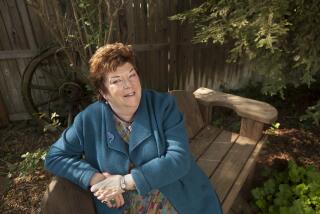Geraldine Woods; Scientist Helped Launch Head Start
- Share via
Geraldine Pittman Woods, a Harvard-Radcliffe-educated neuroembryologist who helped expand opportunities for minorities in education, has died.
Woods was 78 and died Dec. 27 at her home in Aliso Viejo after a lengthy illness, said Sybil J. Thomas Coker, a family spokesperson.
A longtime resident of Los Angeles before retiring to Orange County, Woods was active for decades in Delta Sigma Theta, a predominantly black national public service sorority of more than 190,000 college-educated women. She served as its national president from 1963 to 1967 and chaired its national convention in Los Angeles during the Watts riots.
As national president, Woods helped spur the development of the Head Start program for disadvantaged preschool children, particularly in the Los Angeles area. The Los Angeles chapter of Delta Sigma Theta operates 14 Head Start centers, including one named in Woods’ honor, the Geraldine Pittman Woods Head Start/State Preschool Center in Venice.
Woods also launched the Minority Biomedical Support and Minority Access to Research Careers programs for the National Institutes of Health, which help undergraduate and graduate students and professors pay for tuition, supplies and equipment. More than 20,000 students in 100 institutions have benefited from the programs since their inception in 1972.
Woods was born in 1921 to Oscar and Susie Pittman in West Palm Beach, Fla. Although the Pittmans never made it past eighth grade, they were determined that their daughter would go “as far as I wanted,” Woods recalled in a 1980 interview with The Times.
The Pittmans had what their daughter called the “hustle”: They had entrepreneurial talent, which they applied to restaurants, farming and lumber ventures. They later turned to real estate, making shrewd investments that supported the family so well that after her husband died, Susie Pittman was able to send their daughter to Howard University and later to Radcliffe-Harvard “without ever having to take a job.”
Woods’ talent was in science. A professor at Howard encouraged her to pursue his specialty, embryology, and to study at Harvard. As a Southern black woman, she was a rarity at the exclusive Eastern college in the 1940s. But she was quick to recognize what it would take to succeed there.
“I remember walking into a physiology course and seeing all the white students working with the various instruments, which I’d never seen before,” she once recalled. “I said to myself, ‘So that’s the name of the game,’ and I got up early every morning and stayed late every night.”
Woods earned her master’s degree and doctorate in three years and was elected to Phi Beta Kappa.
She was active in her field for only a few years, however, retiring to become a full-time homemaker when she married Dr. Robert Woods, a dentist.
“I had a drive to be good in school,” she said, “but no drive to conquer the world.”
She did, however, change the worlds she touched.
“She was a leader’s leader,” said Harriette F. Williams, a past president of Delta Sigma Theta’s Los Angeles Alumnae Chapter.
Entering elite circles after her election as head of the national sorority, Woods was invited to Washington by Lady Bird Johnson in 1965 for a meeting with other leaders about the Head Start program, intended to help poor children enter school on an equal footing with more privileged youngsters. When she returned, she told Williams the Los Angeles chapter had to become involved in this initiative.
“I said, ‘Jerry, I’m busy with the national convention,’ ” Williams recalled. “She said, ‘You are never too busy to do community service.’ ”
Woods was active in the civil rights movement, leading a student emergency fund that raised money for scholarships as well as to pay fines and bonds for students arrested in demonstrations. According to “In Search of Sisterhood: Delta Sigma Theta and the Challenge of the Black Sorority Movement” by Paula Giddings, one of the last $1,000 donations the fund made was in 1963 to Stokely Carmichael, then head of the Student Nonviolent Coordinating Committee.
Woods was also noted for her leadership training for black women. On one of her lobbying trips to Capitol Hill during the civil rights movement, she brought along the sorority’s financial committee chair, who turned to Woods and declared that she would one day become a member of Congress. That was Barbara Jordan, who became the first black and first woman elected to Congress, from Texas in 1972.
Woods also helped establish the Center for Research on African American Women, the first center of its kind. Housed in Washington at the Delta Sigma Theta Research and Educational Foundation, it is a repository for information on the social and economic characteristics of African American women.
She became the first woman to head Howard University’s board of trustees in 1975 and served for 13 years. Howard established an endowed chair in her name.
In addition to her husband, Woods is survived by daughters Jan Rooks of Santa Monica and Jerri Woods of Glendale, son Robert of Palo Alto and three grandchildren. A memorial service will be held Jan. 21 at 7:30 p.m. at the Congregational Church of Christian Fellowship, 2085 S. Hobart Blvd., Los Angeles. Donations may be made to the Geraldine P. Woods Endowment Fund, c/o Grozellia Herring, Howard University College of Medicine, 2225 Georgia Ave. NW, Washington DC 90059.
Times staff writer Gayle Pollard Terry contributed to this story.
More to Read
Sign up for Essential California
The most important California stories and recommendations in your inbox every morning.
You may occasionally receive promotional content from the Los Angeles Times.














